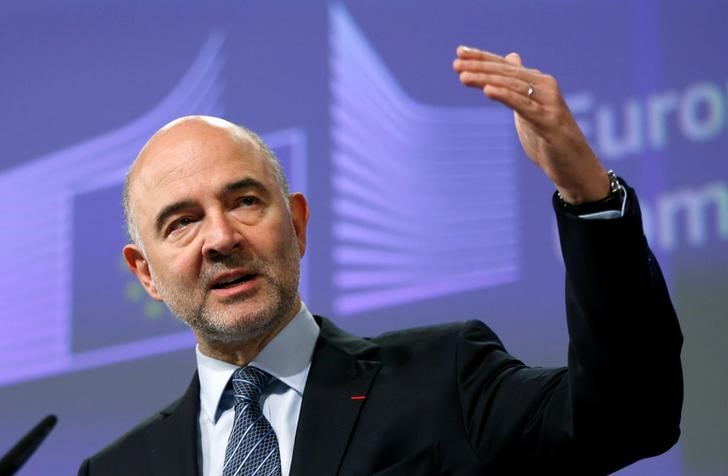WASHINGTON (Reuters) - Italy can count on all the flexibility European Union budget rules can offer with its 2017 budget but it should not increase its already very high debt, European Commissioner for Economic and Financial Affairs Pierre Moscovici said on Saturday.
"We understand that Italy can, and must benefit from all flexibility available," Moscovici told Reuters in an interview on the sidelines of the International Monetary Fund meetings.
"It was already the case in the past, with the investment clause, the structural reforms clause, with the cyclical clause, and, of course, we can also integrate exceptional events due to welcoming refugees or to an earthquake," he said.
Euro zone countries are obliged by EU rules to move towards a balanced budget and lower public debt every year. They send their budget draft assumptions for the following year to Brussels for scrutiny if they comply with EU laws.
But Italian Prime Minister Matteo Renzi is anxious to avoid unpopular belt tightening ahead of a December referendum on constitutional reform that could decide his political future, testing his popularity against the euro-sceptic Five Star movement.
He is therefore planning no cut in the deficit next year and expects a rise in debt, contrary to promises made to the EU.
Yet Moscovici stressed the EU needed Italy at its core.
"We want a strong Italy, clearly we need an Italy which is pro-European, which is at the heart of Europe and which recovers," he said.
Last month, Rome raised the 2017 deficit plan to 2.0 percent of GDP from 1.8 percent. With extra spending on immigration and earthquake reconstruction the real deficit next year could hit 2.4 percent, the same as in 2016, Renzi said.
Italy has repeatedly raised its deficit targets in recent years. The 2017 goal had stood at 1.1 percent until April, when Renzi lifted it to 1.8 percent.
Rome also said that despite repeated assurances, it would not lower the debt-to-GDP ratio this year, saying it would come in at 132.8 percent against a previous target of 132.4 percent. It stood at 132.3 percent in 2015.
Brussels is particularly concerned about Italy's public debt, which is the highest in the euro zone after Greece's, and Moscovici said the government would have to address that.
"We believe that raising public debt above the current level is not reasonable, because the burden is already very heavy," Moscovici said. "This is why we need to find the right figure in order not to have that outcome," he said.
He said that the Commission was already helping Italy in a subtle way by increasing its focus on a measure of compliance with EU fiscal rules, the Stability and Growth Pact, called the expenditure benchmark.
The measure, introduced in 2011, sets a limit on the rise of government expenditure at below the rate of country's potential growth, measured as an average over 10 years - five years back, the current year and four years of future forecasts.
"When considering the output gap for Italy we already extended the period of calculation, so this Commission is ready to be more subtle, you can be subtle, you don't need to destroy the Pact," Moscovici said.

"So full flexibility and intelligence - yes, but breaking the rules, we are not available for that," he said.